octane Lexus IS250 2010 Using The Bluetooth Audio System / LEXUS 2010 IS350 IS250 OWNERS MANUAL (OM53A23U)
[x] Cancel search | Manufacturer: LEXUS, Model Year: 2010, Model line: IS250, Model: Lexus IS250 2010Pages: 578, PDF Size: 16.25 MB
Page 84 of 578
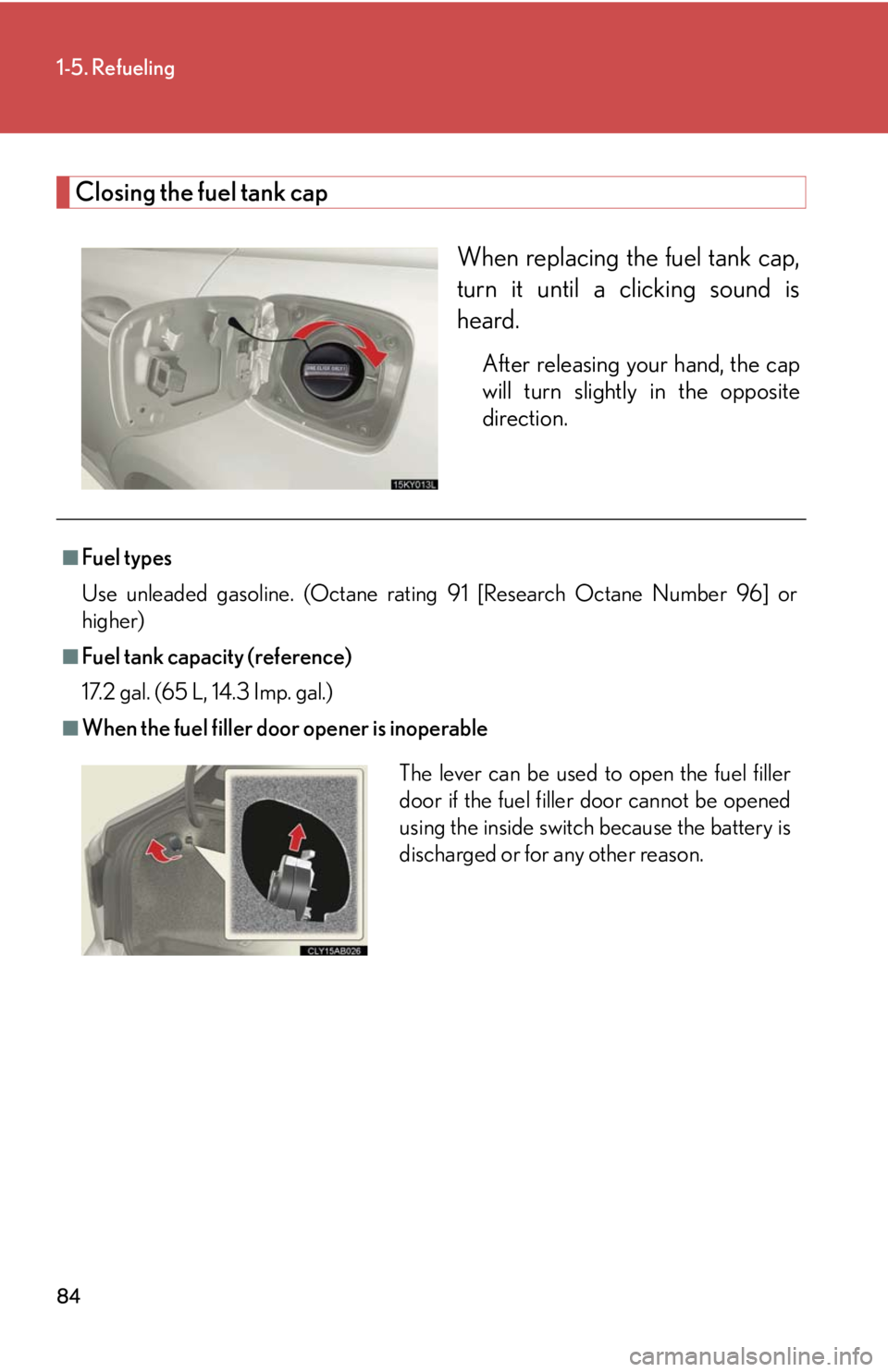
84
1-5. Refueling
Closing the fuel tank cap
When replacing the fuel tank cap,
turn it until a clicking sound is
heard.
After releasing your hand, the cap
will turn slightly in the opposite
direction.
■Fuel types
Use unleaded gasoline. (Octane rating 91 [Research Octane Number 96] or
higher)
■Fuel tank capacity (reference)
17.2 gal. (65 L, 14.3 Imp. gal.)
■When the fuel filler door opener is inoperable
The lever can be used to open the fuel filler
door if the fuel filler door cannot be opened
using the inside switch because the battery is
discharged or for any other reason.
Page 524 of 578
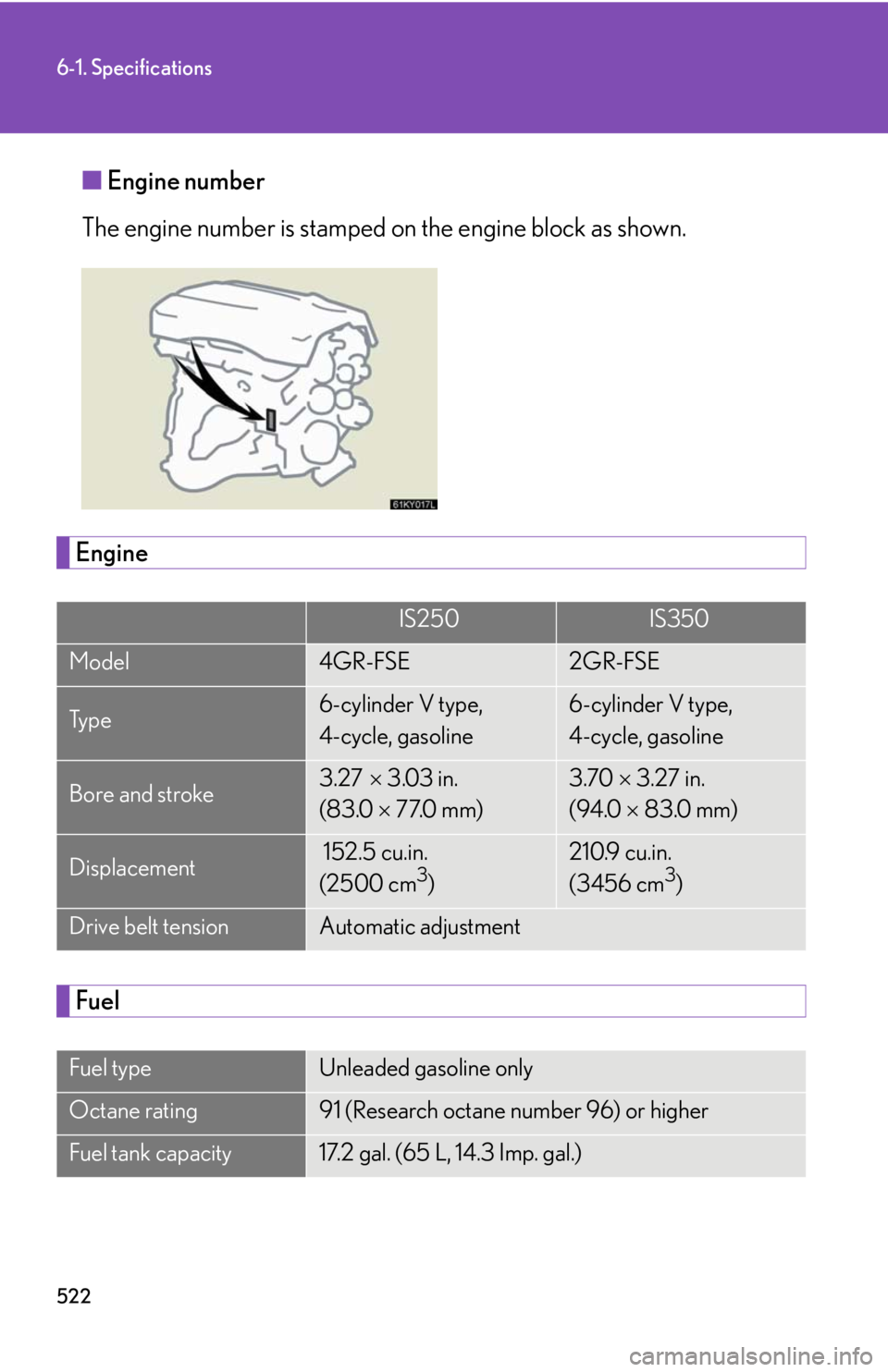
522
6-1. Specifications
■Engine number
The engine number is stamped on the engine block as shown.
Engine
Fuel
IS250IS350
Model4GR-FSE2GR-FSE
Ty p e6-cylinder V type,
4-cycle, gasoline6-cylinder V type,
4-cycle, gasoline
Bore and stroke3.27 3.03 in.
(83.0 77.0 mm)3.70 3.27 in.
(94.0 83.0 mm)
Displacement 152.5 cu.in.
(2500 cm3)
210.9 cu.in.
(3456 cm3)
Drive belt tensionAutomatic adjustment
Fuel typeUnleaded gasoline only
Octane rating91 (Research octane number 96) or higher
Fuel tank capacity17.2 gal. (65 L, 14.3 Imp. gal.)
Page 537 of 578
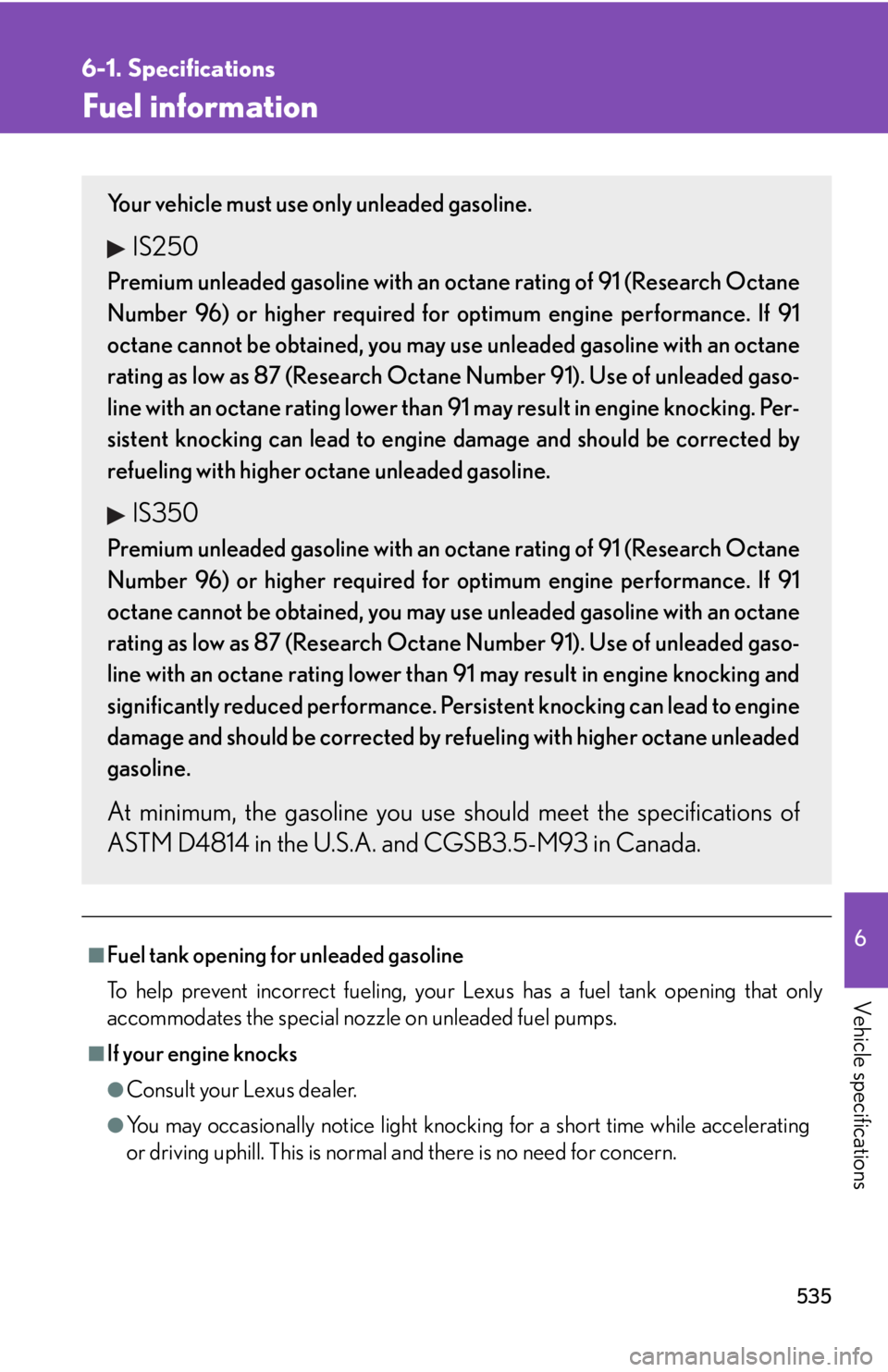
535
6-1. Specifications
6
Vehicle specifications
Fuel information
■Fuel tank opening for unleaded gasoline
To help prevent incorrect fueling, your Lexus has a fuel tank opening that only
accommodates the special nozzle on unleaded fuel pumps.
■If your engine knocks
●Consult your Lexus dealer.
●You may occasionally notice light knocking for a short time while accelerating
or driving uphill. This is normal and there is no need for concern.
Your vehicle must use only unleaded gasoline.
IS250
Premium unleaded gasoline with an octane rating of 91 (Research Octane
Number 96) or higher required for optimum engine performance. If 91
octane cannot be obtained, you may use unleaded gasoline with an octane
rating as low as 87 (Research Octane Number 91). Use of unleaded gaso-
line with an octane rating lower than 91 may result in engine knocking. Per-
sistent knocking can lead to engine damage and should be corrected by
refueling with higher octane unleaded gasoline.
IS350
Premium unleaded gasoline with an octane rating of 91 (Research Octane
Number 96) or higher required for optimum engine performance. If 91
octane cannot be obtained, you may use unleaded gasoline with an octane
rating as low as 87 (Research Octane Number 91). Use of unleaded gaso-
line with an octane rating lower than 91 may result in engine knocking and
significantly reduced performance. Persistent knocking can lead to engine
damage and should be corrected by refueling with higher octane unleaded
gasoline.
At minimum, the gasoline you use should meet the specifications of
ASTM D4814 in the U.S.A. and CGSB3.5-M93 in Canada.
Page 538 of 578
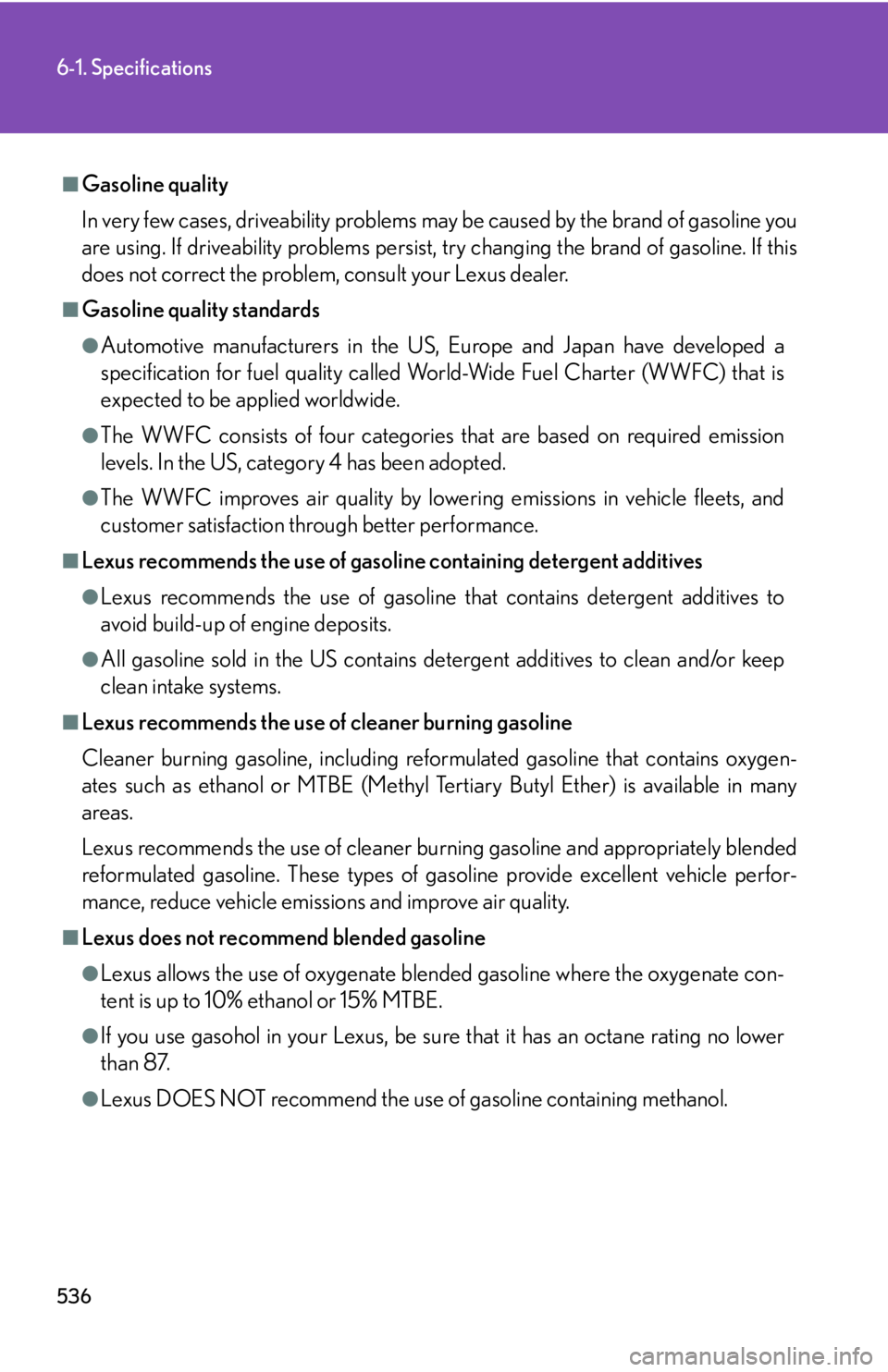
536
6-1. Specifications
■Gasoline quality
In very few cases, driveability problems may be caused by the brand of gasoline you
are using. If driveability problems persist, try changing the brand of gasoline. If this
does not correct the problem, consult your Lexus dealer.
■Gasoline quality standards
●Automotive manufacturers in the US, Europe and Japan have developed a
specification for fuel quality called World-Wide Fuel Charter (WWFC) that is
expected to be applied worldwide.
●The WWFC consists of four categories that are based on required emission
levels. In the US, category 4 has been adopted.
●The WWFC improves air quality by lowering emissions in vehicle fleets, and
customer satisfaction through better performance.
■Lexus recommends the use of gasoline containing detergent additives
●Lexus recommends the use of gasoline that contains detergent additives to
avoid build-up of engine deposits.
●All gasoline sold in the US contains detergent additives to clean and/or keep
clean intake systems.
■Lexus recommends the use of cleaner burning gasoline
Cleaner burning gasoline, including reformulated gasoline that contains oxygen-
ates such as ethanol or MTBE (Methyl Tertiary Butyl Ether) is available in many
areas.
Lexus recommends the use of cleaner burning gasoline and appropriately blended
reformulated gasoline. These types of gasoline provide excellent vehicle perfor-
mance, reduce vehicle emissions and improve air quality.
■Lexus does not recommend blended gasoline
●Lexus allows the use of oxygenate blended gasoline where the oxygenate con-
tent is up to 10% ethanol or 15% MTBE.
●If you use gasohol in your Lexus, be sure that it has an octane rating no lower
than 87.
●Lexus DOES NOT recommend the use of gasoline containing methanol.
Page 539 of 578
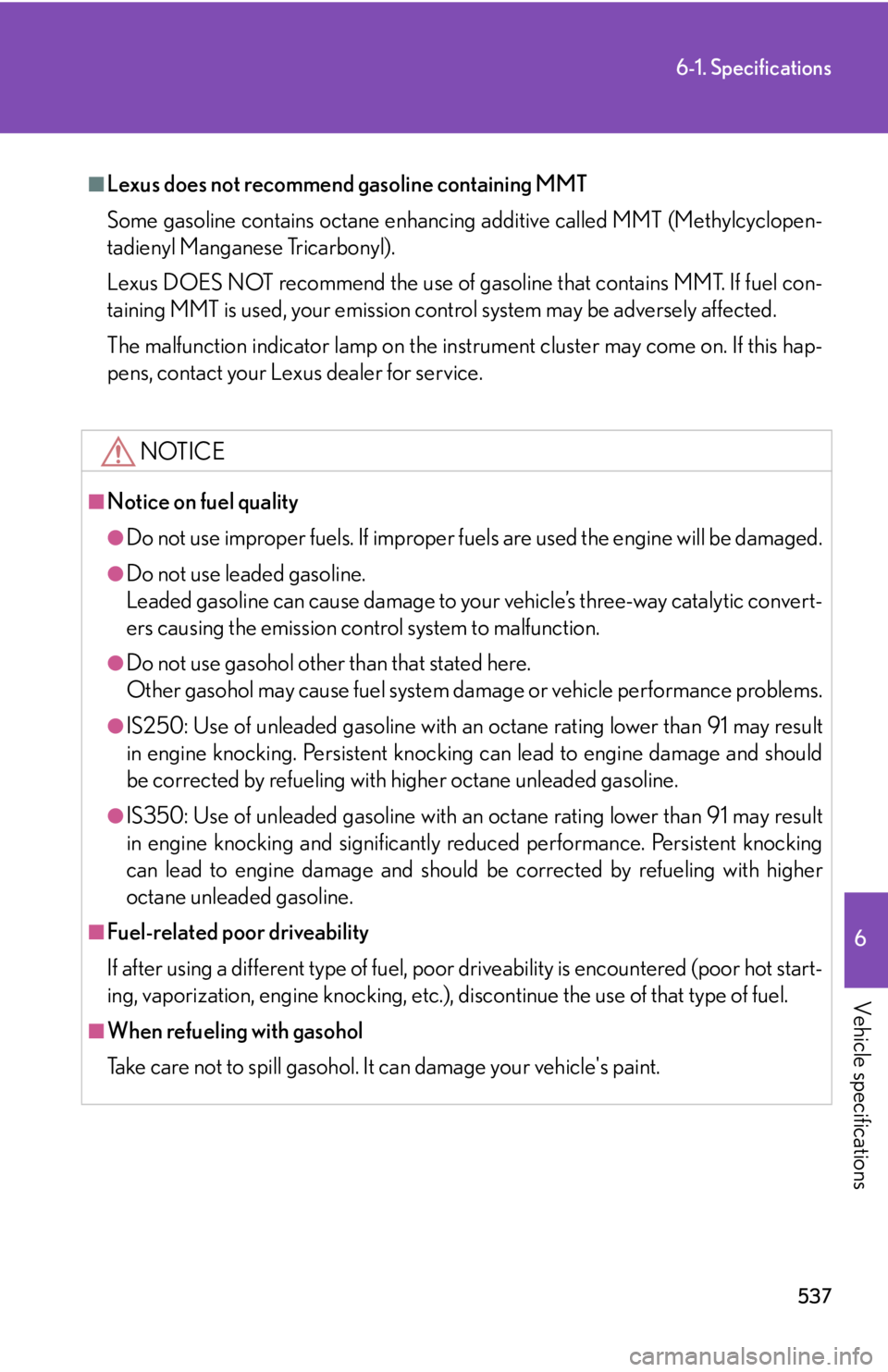
537
6-1. Specifications
6
Vehicle specifications
■Lexus does not recommend gasoline containing MMT
Some gasoline contains octane enhancing additive called MMT (Methylcyclopen-
tadienyl Manganese Tricarbonyl).
Lexus DOES NOT recommend the use of gasoline that contains MMT. If fuel con-
taining MMT is used, your emission control system may be adversely affected.
The malfunction indicator lamp on the instrument cluster may come on. If this hap-
pens, contact your Lexus dealer for service.
NOTICE
■Notice on fuel quality
●Do not use improper fuels. If improper fuels are used the engine will be damaged.
●Do not use leaded gasoline.
Leaded gasoline can cause damage to your vehicle’s three-way catalytic convert-
ers causing the emission control system to malfunction.
●Do not use gasohol other than that stated here.
Other gasohol may cause fuel system damage or vehicle performance problems.
●IS250: Use of unleaded gasoline with an octane rating lower than 91 may result
in engine knocking. Persistent knocking can lead to engine damage and should
be corrected by refueling with higher octane unleaded gasoline.
●IS350: Use of unleaded gasoline with an octane rating lower than 91 may result
in engine knocking and significantly reduced performance. Persistent knocking
can lead to engine damage and should be corrected by refueling with higher
octane unleaded gasoline.
■Fuel-related poor driveability
If after using a different type of fuel, poor driveability is encountered (poor hot start-
ing, vaporization, engine knocking, etc.), discontinue the use of that type of fuel.
■When refueling with gasohol
Take care not to spill gasohol. It can damage your vehicle's paint.